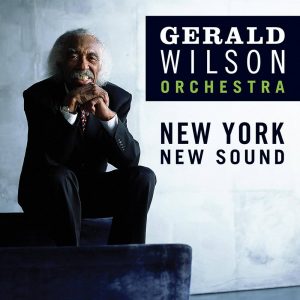
Published on Apr 2, 2004
Gerald Wilson is, according to the biography published in the
jacket material, a legend in his own time in the jazz world. With
85 years in jazz music and still counting, Wilson has attracted the
top talent for this romp through every jazz sound that has cropped
up in a generation. The music on
New York, New Sound is, with the exception of two tracks,
all new compositions by Wilson. Two songs on the album are
Grammy-winners, and the tracks that Wilson didn’t compose himself
are classics originally composed by Miles Davis and John Coltrane.
One would almost have to have no sense of honor to dispute the
accomplishments this album celebrates.
I do have a sense of honor, and I do think that this is a fine
album of jazz music. Written by Wilson after a lengthy stay in LA,
the Latino flavor is very evident in both “Viva Terado” and “M
Capetillo.” Wilson’s instrument when he played with Count Basie was
the trumpet, and it is evident throughout the album that the
classic big band sound is where home is for Wilson. The musicians
brought together to play as an orchestra under Wilson’s leadership
are definitely top notch. The jacket art lists the soloists for
each track; there are an average of 4 soloists per track and 25
members to the orchestra. While there are too many soloists to list
the pros and cons of each, a few musicians stand out. Gerald
Wilson’s son, Anthony, plays 4 excellent solos on the guitar, and
Kenny Barron on piano is another favorite. Frank Wess on tenor sax
plays an excellent haunting melody.
New York, New Sound is a great example of current musicians
playing classic jazz, almost to a fault. There’s no arguing that
this music is excellent, but there isn’t a sense of anything behind
the music. My only complaint about the recordings on this album is
that it is so, well, orchestrated. Without reading the jacket
material, I never would have guessed that there were solos on this
album, at least not the sort of spontaneous solos that are evident
in earlier jazz, where the arranger was one of the artists. While I
admire the music for its own sake, I’m not sure that this album
will attract my attention later, due to the fact that it feels like
a technical lesson or history lesson, rather than a wild thrash put
together on the spot.
There are many things to recommend this album. It is a stellar
recording of an orchestra; the solos are clear without swamping the
rest of the band, and there is a variety of music exhibiting every
American influence on jazz. For people planning 1920’s themed
events, this would be some of the most appropriate mood music to be
found. I’m not sure that I will ever play the CD just for fun on my
own, though. It will probably sit on my shelf until I want to let
someone listen to an example of classic jazz.